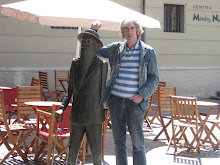I read today about some reforms to the Portuguese language. This may also lead to yet more alterations to the Galician language in the coming years as there is a movement to make Galician even closer to Portuguese for reasons which include improved communication for trading purposes with the Portuguese-speaking world.
The following is loosely translated from www. caetanobarata.wordpress.com (an interesting Brazilian blog):
From January 2008, Brazil, Portugal and other Portuguese speaking countries will undergo language reforms in an effort to unify spelling. Portuguese is the third most spoken western language after English and Spanish. (Hands up, who thought it was French?) Having two different spelling systems (Brazilian and European Portuguese) impedes the spread of the language at international events. Unification would help define criteria for exams and certificates for foreigners. The proposed modifications would result in about 1.6% of the vocabulary in Portugal being modified while only 0.45% of Brazilian words would be affected. However, it will not influence pronunciation differences in any of the countries.
The figures show a general drift towards the Brazilian form of Portuguese. That may be why Portugal appears to be in no hurry to introduce these reforms. Isabel Pires de Lima, the Portuguese culture minister has said that the reforms will come into force within ten years.
Some examples of the reforms include:
In Brazilian Portuguese the circumflex will be removed from words like “abençôo”, “enjôo” and “vôo” which will now be spelt “abençoo”, “enjoo” and “voo”.
The dieresis will be done away with altogether. That is, “linguiça” will replace “lingüiça”, “frequência” instead of “freqüência” and so on.
The new alphabet will consist of 26 letters as “k”, “w” and “y” are added.
In Portugal, the “c” and “p” will disappear from words where the letter is not pronounced. For example in “acçio”, “acto” and “baptismo”.
Also, in Portugal, the “h” will disappear from some words such as “húmido” which will be spelt like the Brazilian “úmido”.
MORE ON THE PORTUGUESE-SPEAKING WORLD
http://bama.ua.edu/~clc/portuguese/portuguese_language_info.htm
MORE ON GALICIAN
http://en.wikipedia.org/wiki/Galician_language
Thursday, December 13, 2007
Grass backs Saramago
In an interview with the Portuguese magazine Expresso the German author Günter Grass has given his backing to the idea of uniting Portugal and Spain suggested by José Saramago.
“Maybe it won’t happen but it should be given some thought. A single Iberian federal state in Europe would carry more weight than two individual ones,” says Grass.
He adds that the suggestion is interesting and that Saramago deserves credit for speaking his mind on controversial subjects.
Read more about what Grass had to say on other European issues at my other blog
www.catadonia.blog.co.uk
“Maybe it won’t happen but it should be given some thought. A single Iberian federal state in Europe would carry more weight than two individual ones,” says Grass.
He adds that the suggestion is interesting and that Saramago deserves credit for speaking his mind on controversial subjects.
Read more about what Grass had to say on other European issues at my other blog
www.catadonia.blog.co.uk
Subscribe to:
Posts (Atom)
